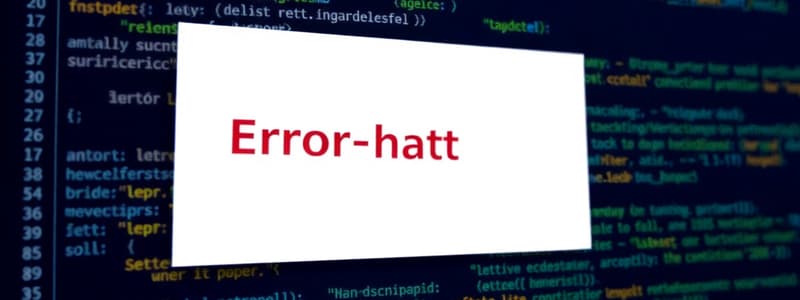Podcast
Questions and Answers
What happens when an exception is raised inside the test_function when the input parameter is 12?
What happens when an exception is raised inside the test_function when the input parameter is 12?
- The program continues to the next line after the exception.
- The execution is interrupted and nothing after the exception is executed. (correct)
- The always printed message in the finally block will still execute. (correct)
- The exception is caught only if it's during the try block before the function call.
What is the correct order of execution when an exception is raised in the test_function?
What is the correct order of execution when an exception is raised in the test_function?
- Finally block executes before any except handling.
- start function -> except block -> try block
- try block -> finally block -> except block
- try block -> except block -> finally block (correct)
What is the purpose of the finally block in the given code?
What is the purpose of the finally block in the given code?
- To skip the execution of the code if an exception occurs.
- To handle the exception and log an error.
- To ensure that certain code executes no matter what. (correct)
- To provide an additional layer of exception handling.
Which of the following is considered a best practice for error handling with exceptions in Python?
Which of the following is considered a best practice for error handling with exceptions in Python?
Which exception type is generally raised when an invalid argument is passed to a function in Python?
Which exception type is generally raised when an invalid argument is passed to a function in Python?
What is the purpose of using a try-except block in Python?
What is the purpose of using a try-except block in Python?
Which of the following exceptions would be specifically caught by Python's ValueError?
Which of the following exceptions would be specifically caught by Python's ValueError?
What happens to the execution flow when an exception is raised in the try block?
What happens to the execution flow when an exception is raised in the try block?
What does the finally block do in a try-except structure?
What does the finally block do in a try-except structure?
Which of the following is a best practice for error handling in Python?
Which of the following is a best practice for error handling in Python?
Which of the following exceptions is raised when trying to access an invalid index in a list?
Which of the following exceptions is raised when trying to access an invalid index in a list?
What is the consequence of not handling exceptions properly in a program?
What is the consequence of not handling exceptions properly in a program?
Which exception is raised when a division by zero occurs in Python?
Which exception is raised when a division by zero occurs in Python?
In which scenario would you prefer to use a specific exception instead of a generic Exception?
In which scenario would you prefer to use a specific exception instead of a generic Exception?
How can exceptions be raised deliberately in Python?
How can exceptions be raised deliberately in Python?
What happens if the ZeroDivisionError exception block is placed last in the order of exception blocks?
What happens if the ZeroDivisionError exception block is placed last in the order of exception blocks?
In the context of exception handling, when should the Exception block be placed?
In the context of exception handling, when should the Exception block be placed?
What is the purpose of the finally block in a try-except structure?
What is the purpose of the finally block in a try-except structure?
How can you manually trigger an exception in Python?
How can you manually trigger an exception in Python?
What type of exception will be raised if an age below 16 is inputted?
What type of exception will be raised if an age below 16 is inputted?
What is a key characteristic of the Exception block?
What is a key characteristic of the Exception block?
In raising an exception manually, what must you provide?
In raising an exception manually, what must you provide?
What will happen if the return statement inside a try block is executed?
What will happen if the return statement inside a try block is executed?
What is the outcome of an unsupported operation in the try block?
What is the outcome of an unsupported operation in the try block?
What can be done within the raise statement when defining a specific error?
What can be done within the raise statement when defining a specific error?
What output is expected when a valid input is entered in the age example?
What output is expected when a valid input is entered in the age example?
In the example where coin toss is evaluated, what happens when an invalid option is chosen?
In the example where coin toss is evaluated, what happens when an invalid option is chosen?
Flashcards
Errors in Programming
Errors in Programming
Problems that can occur during a program's execution.
Exceptions
Exceptions
Specific types of errors that interrupt program flow, typically during runtime.
try-except Block
try-except Block
A code structure to handle exceptions, allowing the program to continue despite errors.
except block
except block
Signup and view all the flashcards
finally block
finally block
Signup and view all the flashcards
Raising Exceptions
Raising Exceptions
Signup and view all the flashcards
Exceptions Across Functions
Exceptions Across Functions
Signup and view all the flashcards
ValueError
ValueError
Signup and view all the flashcards
TypeError
TypeError
Signup and view all the flashcards
ZeroDivisionError
ZeroDivisionError
Signup and view all the flashcards
Exception Handling
Exception Handling
Signup and view all the flashcards
Exception in Function
Exception in Function
Signup and view all the flashcards
Exception Propagation
Exception Propagation
Signup and view all the flashcards
Specific Exceptions
Specific Exceptions
Signup and view all the flashcards
Order of Exceptions
Order of Exceptions
Signup and view all the flashcards
General Exception
General Exception
Signup and view all the flashcards
What does finally do?
What does finally do?
Signup and view all the flashcards
Why use finally?
Why use finally?
Signup and view all the flashcards
Raising an Exception
Raising an Exception
Signup and view all the flashcards
What is a raise statement for?
What is a raise statement for?
Signup and view all the flashcards
What is a ValueError?
What is a ValueError?
Signup and view all the flashcards
What is a TypeError?
What is a TypeError?
Signup and view all the flashcards
What is a ZeroDivisionError?
What is a ZeroDivisionError?
Signup and view all the flashcards
How do exceptions behave across functions?
How do exceptions behave across functions?
Signup and view all the flashcards
How to handle exceptions in a function?
How to handle exceptions in a function?
Signup and view all the flashcards
Study Notes
Programming Concepts I: Errors and Exceptions
- Errors can occur at any point during a program's execution.
- Anticipating all potential errors is impossible.
- User input and interactions with other software/hardware can lead to unexpected errors.
- Errors can arise from various sources, including code defects or external factors.
Exceptions
- Exceptions are specific types of errors that halt program execution.
- Modern programming languages (like Python) have exception handling mechanisms.
- An exception occurs when a program tries to perform an operation that it cannot handle. For example, trying to divide by zero.
- Handling exceptions keeps the program from crashing.
Try-except Block
- The
tryblock contains the code that might raise an exception. exceptblocks handle specific types of exceptions.- If no exception occurs in the
tryblock, theexceptblocks are ignored. - If an exception occurs in the
tryblock, execution immediately jumps to the matchingexceptblock and stops executing in thetryblock. - You can optionally assign the exception to a variable for more information on the exception
Try-except Example
- A
try...exceptblock is used to handle potential exceptions during the execution of a piece of code. - The code within the
tryblock is executed. - If an exception occurs, the code in the matching
exceptblock executes. - This prevents the program from crashing, due to errors that might be caused by issues with user input.
Specific Exceptions
- Python allows you to catch specific types of exceptions.
- This allows you to provide more tailored error handling.
- Examples include
ValueError,TypeError,ZeroDivisionErrorandIndexError.
Exception Order
- Python checks
exceptblocks in order. - A generic
exceptblock is used to catch exceptions that you haven't anticipated. - The most specific exception should come first.
Finally Block
- The
finallyblock is used to execute code regardless of whether an exception occurs within thetryblock. - This is essential for tasks like releasing resources (e.g., closing files).
Raising Exceptions
- You can explicitly raise an exception using the
raisekeyword. - This is often used to enforce specific conditions (e.g., input validation).
- A message can be included with the exception for more informative error messages
Exceptions Across Functions
- An exception raised within a function can cause the program to stop running.
- This means the program will always execute the
finallyclause within the main block.
Studying That Suits You
Use AI to generate personalized quizzes and flashcards to suit your learning preferences.
Related Documents
Description
This quiz covers the fundamentals of errors and exceptions in programming, focusing on how they can occur during execution and the importance of exception handling. Understand the concepts of try-except blocks and how they prevent program crashes when unexpected conditions arise.




